Wisconsin Right Now traveled to Springfield, Ohio, this month to find the real story beyond the corporate media spin.
Springfield, Ohio – Eric Coleman Sr., 65, is a former U.S. Marine and retired welder. He sits on a frayed stoop in Springfield, Ohio, on a recent Sunday, in the shadow of a Trump flag flying outside his neighbor’s house in this working-class city that is ground zero in the nation’s high-stakes immigration debate. Coleman is a Democrat who is African-American. At first, he says he’s voting for Vice President Kamala Harris. Then, he says he was a lot better off economically four years ago. Ultimately, Coleman says he could vote for Trump or just sit it out.
Coleman attributes his growing economic stress to the surge of Haitian immigrants who have streamed by thousands into Springfield, an industrial city with a once-shrinking population and manufacturing base that was undergoing a “renaissance” that drew the influx. His life has gotten a lot harder since the Haitians got here. Companies were hungry for low-paid workers, and Haitians were hungry for jobs. But so are the American citizens who live there.
Coleman’s rent has skyrocketed from $550 to $1,100 because some landlords now make more money renting homes to Haitians they charge per head to sleep on cots jammed into former single-family homes. He’s not alone. “I know two or three (non-Haitian) families who were kicked out, and Haitians are living in those homes today.”
The U.S. military veteran lives on social security and disability checks that net him only about $1,600 a month. He was denied food stamps. “I’m broke,” he says. Forget cats and dogs; he can’t afford meat and survives on donated “canned goods and juice.” He doesn’t think the Biden-Harris administration, which welcomed the Haitians in, has its priorities straight.
“That doesn’t make sense for the government to give them all of that money and not give Americans. I think the government should recalculate,” he says. “You’re over cluttering us. I think the government should stop that immediately.”
This is somewhat different than the stream of illegal immigrants flooding over the U.S.-Mexico border who took advantage of Biden-Harris’s weak immigration policies; the Haitians flew legally into the United States. Biden and Harris waved their magic wand and made it so. They were granted “immigration parole” and “temporary protected status” by the Biden-Harris administration, a deliberate and calculated policy decision. They’re happening together, though, and they’re causing similar stress on communities.
Here, in Springfield, the Haitian immigration wave is causing some U.S. citizens harm. It’s a story playing out all over America, although that’s not the story the corporate media or Harris want to tell. Biden-Harris rolled out the welcome mat. That’s inarguable.
Once here, the Biden-Harris administration granted the Haitians “temporary protected status” – through a program that Trump tried to kill – which grants them a raft of government benefits and debit cards, including driver’s licenses. It’s meant to be temporary, but the government can extend TPS indefinitely. Of course, if the Haitians have children here, those children are automatically U.S. citizens who will someday be allowed to vote (the Haitian migrants can’t vote legally, but two tell us they might do so anyway).
If Harris won’t promise to stop the Biden-Harris immigration policies, Coleman decides he won’t vote for her after all.
“Trump didn’t start this,” Coleman says.
Coleman doesn’t fit the media’s stereotype of an angry racist or conspiracy theorist railing against immigrants. That’s true for most here. In fact, he expresses empathy for the Haitians and relates to their working-class plight. They want the same things he does. They aren’t the villains of this story. To locals here, the government is. And that starts at the top, with Biden and his VP.
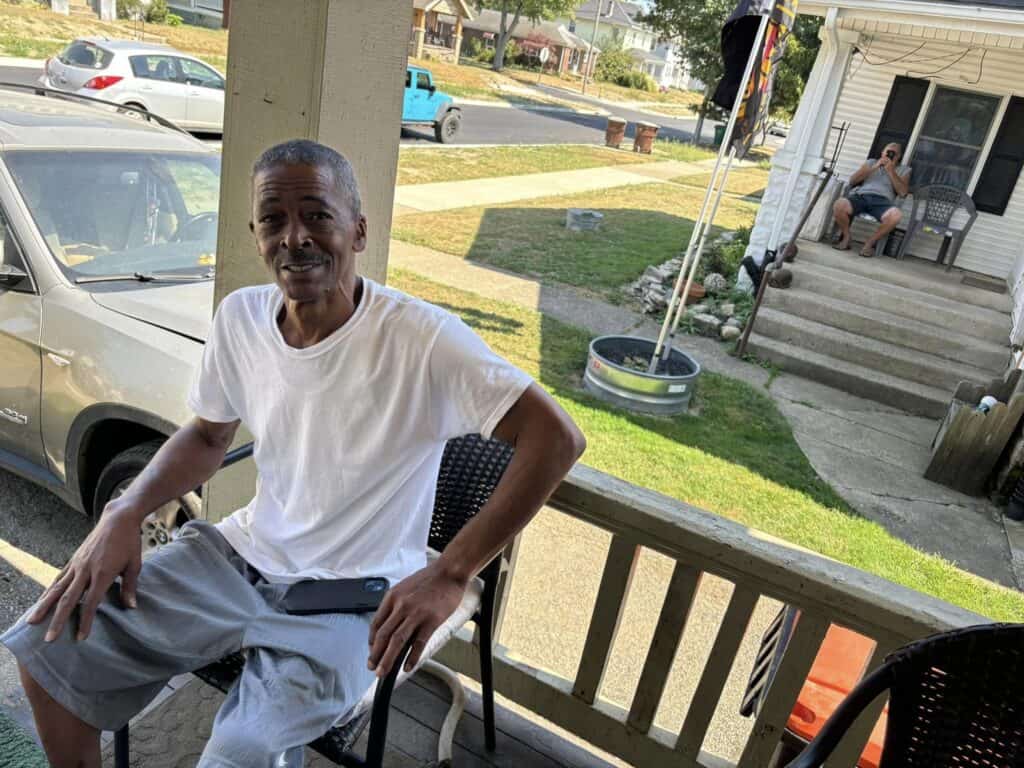
The numbers are staggering. The Haitian population exploded by 15,000 to 20,000 people in a city of just under 60,000, the city manager, Bryan Heck, wrote in a letter. Affluent Martha’s Vineyard residents collectively freaked out over 49 arrivals not that long ago. That was lambasted as a “cruel political stunt” in the media, although those people were soon gone.
“It’s taxing our infrastructure. It’s taxing public safety. It’s taxing our schools. It’s taxing health care…it’s taxing our housing,” Heck said in July, calling the housing crisis “a hundred times worse.”
“It’s setting communities like Springfield up to fail. And, we do not have the capacity to sustain it, and, without additional federal assistance or support, communities like Springfield will fail.”
In Springfield, hard-working lower-income folks in an already distressed city with a poverty rate of 22.7 percent are just supposed to take it. Worse, they’re branded as racists for not wanting to lose their rental homes or jobs.
 “This is being done in the most destructive, damaging and divisive way possible, kicking people out of their homes to move in people willing to live 10 people to a bedroom,” says Bill Monaghan, a former newspaper journalist who speaks near a building with shattered windows in downtown Springfield around the corner from an MSNBC crew.
“This is being done in the most destructive, damaging and divisive way possible, kicking people out of their homes to move in people willing to live 10 people to a bedroom,” says Bill Monaghan, a former newspaper journalist who speaks near a building with shattered windows in downtown Springfield around the corner from an MSNBC crew.
“They want to really gut the working and middle classes,” he says. “To disrupt the whole town and tear the social fabric apart – this is not an accident. This is an effort to dismantle the working class.”
Monaghan doesn’t believe the Haitians are being treated right, either.
“They are jammed in like slave quarters, charged to get back and forth to work. It’s a modern slavery system here, 40 people to a house or 10 people to a bedroom, just cots,” he says.
John Rice, a pastor and realtor, says a relative who is an HVAC contractor “was in a home recently, and 19 Haitians lived on each side of the double. Every room is a bedroom in the house. One house; 38 people.” Rice says home and rent prices have skyrocketed because landlords make more money if they can jam Haitians into a house.
“What is the limit a community can absorb? I think we have far exceeded it,” he says.
It’s not only housing. Locals’ concerns range from hospitals and schools being overwhelmed to dangerous traffic crashes. Traffic crashes in the county rose from 2019 to 2023, according to police data. U.S. citizens have died, and residents described dangerous near misses with Haitians who don’t understand the rules of the road.
One crash involving a Haitian driver took the life of an 11-year-old boy on a school bus whose dad doesn’t want his story politicized. In another widely discussed tragedy, grandmother Kathy Heaton was killed by a Haitian migrant who plowed into her as she put out the trash. “Kathy was struck so violently that both her socks were left behind on the pavement as her body was thrown across the street,” the New York Post reported. The driver wasn’t charged.
The Biden-Harris programs allow the Haitians to receive taxpayer-funded benefits and driver’s licenses. “Enrollment in Medicaid and federal food assistance and welfare programs surged,” Reuters reported. Rent rose 14.6 percent from May through December 2023 and 3.2 percent in 2024 so far.
It can be difficult to tease out the economic stresses on Springfield residents due to immigration from the national pressures under the Biden-Harris economy. For example, although home prices have risen, they’ve done so less than the country as a whole. Rising grocery prices are putting stress on families everywhere.

Community hospitals spend $50,000 monthly for translation services, and the school district gets 40 new students each week, many who can’t speak English. The police chief told NPR that calls for service, property crimes, and translation needs are up, although police aren’t tying crime increases to immigrants.
Ohio’s Republican Gov. Mike DeWine sent $2.5 million in taxpayer money to Springfield to boost traffic enforcement and deal with growing pressures on medical centers. General healthcare, not communicable diseases, is driving the pressure on healthcare.
“The influx of Haitians to Springfield and Clark County has significantly impacted local primary care providers due to the increased number of patients and the need for more translation services. In general, migrants from Haiti have had little to no healthcare services prior to arriving in the United States, including vaccinations,” DeWine said.

Haitians in Springfield are only part of the story. “Through the end of August 2024, nearly 530,000 Cubans, Haitians, Nicaraguans, and Venezuelans arrived lawfully on commercial flights and were granted parole under these processes,” the U.S. Customs and Border Protection announced on September 16.
“More than 110,000 Cubans, more than 210,000 Haitians, nearly 93,000 Nicaraguans, and nearly 117,000 Venezuelans arrived lawfully and were granted parole,” CBP says.
That’s occurring against the backdrop of record surges of millions of illegal immigrants over the southern border. Even the New York Times admits, “Border crossings were low when Donald Trump left office. But when President Biden is in the White House, they start shooting up and up — to numbers this country had never seen before, peaking in December 2023.”
Rice believes the United States should help Haiti through charitable giving and humanitarian outreach instead. “Our responsibility is first to our people,” he says. “Our church has a food pantry. We are sheltering homeless people right now who are natural-born citizens; people who are in horrible straits who were born here. Our economy is bad to start with. How we can afford to fly in tens of thousands at a time?”
“Why would our government want to do such a thing?”
Dogs & Cats Dominate the Media

The national media fixated on wildlife, pets – and Trump. You can find stories about the other concerns, but they aren’t dominating the narrative.
Coleman, Rice, and Monaghan don’t care much about the pet-eating controversy that has consumed the beltway media and dominated TikTok since Trump accused Haitian immigrants of eating people’s cats and dogs in a viral debate moment.
“I have four or five families on my street, and I’ve never seen them chase a cat or dog and eat it,” Coleman says, but he doesn’t even bring it up until well into our conversation. Like many non-Haitians here, including Trump supporters, the cat-and-dog controversy just isn’t what matters. It’s a shiny ball Trump kicked, and the media are chasing it.
Most Springfield residents we spoke to – including ardent Trump supporters – think Trump overstepped. They don’t think Haitian immigrants are eating cats and dogs in Springfield or at least have no evidence to prove it, although a Haitian man, Jean Pierre, informs us that some Haitians DO eat cats back home.
Springfield residents believe Trump’s comments served a purpose, though, by coaxing an uninterested, biased, and, frankly, lazy national media into finally paying attention to a topic that doesn’t help Democrats (or Harris) but is hurting regular Americans.
“As far as what I took from what I saw on the clip, you know, Trump going, ‘Well, they’re eating pet cats and dogs’ or whatever . . . I just started laughing,” says Springfield resident Al Overholser. “But the whole important thing that I like about him saying that is he shifted everybody’s attention to Springfield, Ohio because we need everybody’s help right now.”
“Springfield is a caring community,” he adds. “But I have a limit. This city has a limit as well. We need help and resources.” He believes Harris and Biden scoffed at concerns.
The liberal and conservative media are wrestling each other for the narrative, with a presidential election at stake. The cage match is occurring in Springfield.
The legacy media repeatedly blares that Trump made false comments about Haitians that follow racist tropes. Some reporters take the word of government as fact and don’t do original reporting on the scene. False, incendiary comments made by Harris and other Democrats don’t get blown up this relentlessly. Corporate journalists paint the influx of Haitians to Springfield in the glossiest terms; the story as they tell it is one of hard-working, maligned immigrants who are doing the jobs Americans won’t. Springfield is on the “upswing.” It’s constructed reality.
“The real story is that for 80 years we were a shrinking city, and now we’re growing,” Carl Ruby, the senior pastor at Central Christian Church, told NBC. “There is a workforce here just waiting.” But Springfield residents say there was no clear plan and too many people came too fast.

“We needed a workforce,” Amy Donahoe, director of workforce development with the Greater Springfield Partnership, told Reuters.
In contrast, some independent media and conservative pundits have focused on trying to prove Trump’s comments had substantial truth to rescue him from his latest hyperbole. A man produced a sickening video he says shows people from the Congo grilling a cat in Dayton! There’s 911 audio of a man complaining Haitians were grabbing geese in Springfield’s Snyder Park! There’s a 911 call from a woman whose cat is missing and found meat in her backyard! (But when the Wall Street Journal went to interview her, she revealed she found “Miss Sassy” alive and unharmed, hiding in her basement.)
Those just aren’t the things locals really care about. Yet they’re the ones painted as racists by legacy reporters who are, in some cases, sitting on their butts in New York.
“I did pray over my city. The cat and dog thing is ridiculous. They’re spinning it out of control,” says Lisa Brannon, 47, referring to the media. A Trump flag flies on her porch. Across the street, Haitians have moved in.
Brannon believes Trump should have focused on something else. “There were better topics,” she says. “Our resources are being depleted right now.”
She doesn’t agree with the corporate media’s narrative that the immigration surge has been largely great for Springfield, either. Brannon’s friend, a domestic violence survivor, is staying with her because she can’t find affordable housing. Her family’s benefits were denied. Homeless people need meals, but shelters recently shut down.
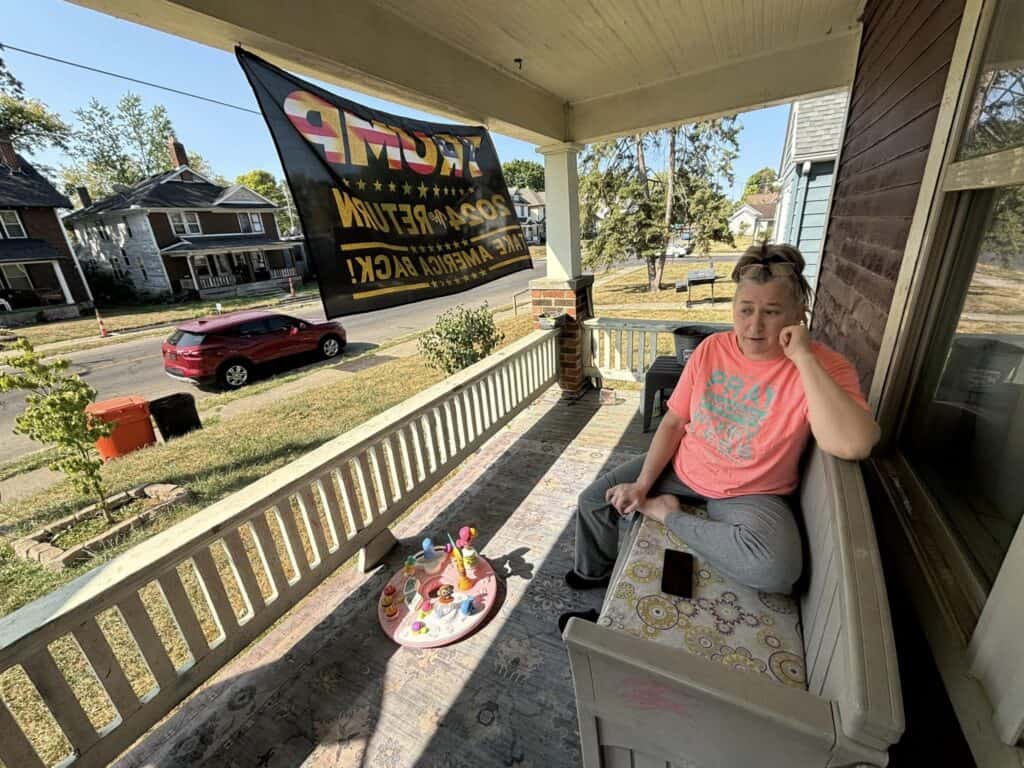
“Every five houses on this block, there’s been a Haitian that’s moved in,” she says. Brannon says the Haitians have had hatred “spewed at them,” which is terrible. “I understand that the Haitians are coming from a war-torn country, but we can’t help people unless we can help ourselves.”
The American people, she says, “can’t afford” to subsidize the Haitians. Brannon used to work at Family Dollar, and Haitians “would ask me to help them pull their money off their” government cards. “And it wasn’t just one card,” she says.
Brannon says she’s called in many traffic accidents at the intersection near her home caused by Haitians.
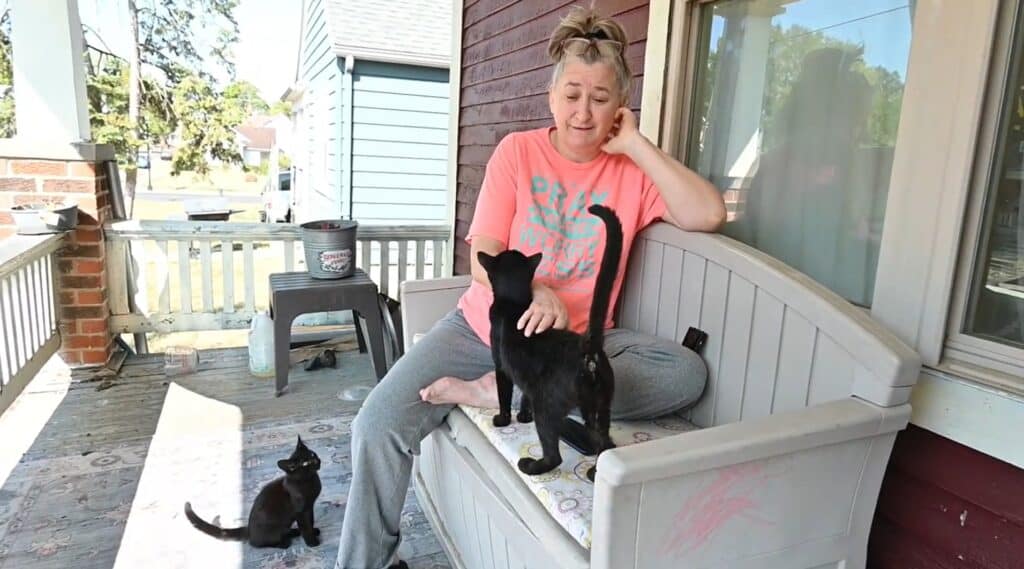 Fundamentally, the tension isn’t over cats or dogs at all, as it turns out; it is about a country’s allocation of, and prioritization of, its resources.
Fundamentally, the tension isn’t over cats or dogs at all, as it turns out; it is about a country’s allocation of, and prioritization of, its resources.
The controversy intensifies in an impoverished community like Springfield, which is pocked with foreclosed homes (locals say some Haitians are living in them), in a nation struggling with soaring inflation. Springfield was already a city in distress; the median income “dropped 27% between 1999 and 2014 . . . a bigger dip than any metropolitan area in the country,” USA Today reported.
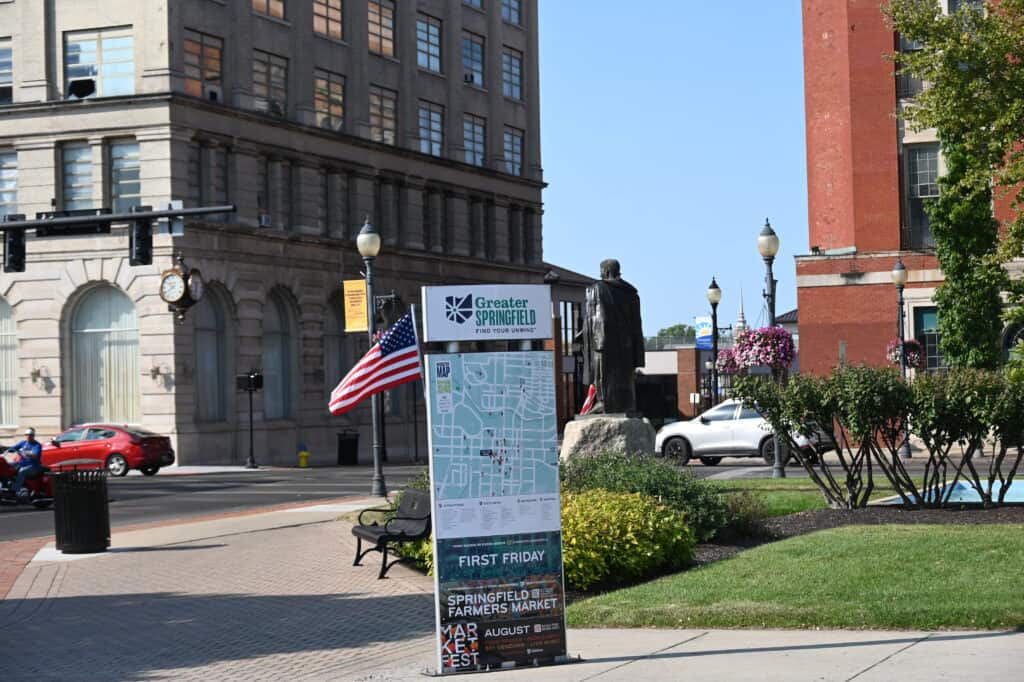
It’s a story repeating in communities throughout America, from Aurora to Chicago.
Kyle Koehler is a former state representative who is running for state Senate in Ohio. He says the community wasn’t properly informed that the surge was coming. Temp agencies, churches, and businesses encouraged the Haitians to come here, some profiting greatly. “We didn’t know it was happening.”
Koehler said there’s been great “stress on our education system.” The local health care center is “overwhelmed.” The traffic accident stories are true. “People are concentrating on the cats more than the people. The issue is the social – the government – services that are being overwhelmed.”
“In the end, it’s just overwhelmed our community,” he says.
A couple of months ago, Koehler appeared at a press conference to highlight these concerns. Only one reporter came. But that was before Trump started talking about cats.
Jeff and Lori Clos have lived in Springfield for 54 and 30 years, respectively. He works in a trucking company. She was unemployed until recently. “I was actually displaced from my previous job,” she says. She was told the company was “doing away with my position.”
“After that, they started bringing in a lot of Haitians through the local temp service,” she says.
“Ten-fifteen people were let go the same week. The next week, they were bringing in the temp service people to run it,” she says. “It makes me angry. I work hard to raise the money we need to survive. Now you can’t survive on a one household income. It’s taking me three months to find a job. They keep saying the jobs are plentiful.” She’s done everything from factory to office jobs.
She doesn’t believe the media narrative is true.
“No. I’ve applied at some of these places hiring all the Haitians and never got a callback,” she says. “They hear they can bring the Haitians in for a cheaper rate than Americans can afford to work for.”
Ryan McKinney was working as a seasonal worker for Amazon when, one day, his key card (and others’ cards) wouldn’t work. That’s the same Amazon owned by Jeff Bezos, who also owns the Washington Post.
“I looked in the training center and saw it full of people from the Haitian community,” he says. McKinney is an admin on a Facebook page called “Stop the Influx Into Springfield, Ohio.”
“I strongly believe we were singled out to put the Haitians in,” he says. There are some cultural tensions. McKinney says he saw Haitians “literally washing their feet and hair in the bathroom sinks.”
Local leaders and police have pushed back hard against the pet-eating accusations, saying they’ve seen no evidence. Many reporters have taken the word of government as gospel.
To be sure, social media has caused problems even as it also informs. Yet without social and independent media – and especially the free speech zone on X – we’d be left with the corporate media’s narratives on Springfield. They’re warped, politicized in one direction, and far from the whole story. The corporate media say Trump isn’t being honest about Springfield, but are they?
The disturbing body cam video of a woman eating a cat is from Canton, Ohio, and she’s not Haitian. The viral photos of a man carrying dead geese were in Columbus, and they were killed by a car. The social media post about a cat being skinned and hung in Springfield was fourth-hand information that its author has taken back.
“One of the things that I heard that bothered me very much, and I’ve actually had quite a few people contacting me lately, is some pretty horrid things occurring to domesticated animals in the neighborhood. We’ve had some stuff in the park,” Heck, the city manager, said on video in March. Asked for proof, he said anonymous people had confided in him.
However, locals tell us, that’s the sideshow, not the story.
Trump’s running mate, Ohio U.S. Sen. JD Vance, has more recently tried to shift the conversation toward economic and safety concerns affecting people instead of pets. The media, however, are now focusing on the 33 bomb threats that resulted in closings throughout Springfield. Some outright blamed Vance for them. Then, DeWine revealed all of the bomb threats were hoaxes, with many coming from overseas.
Although our key goal wasn’t to prove or disprove the pet angle during our two days in Springfield this September, we did ask everyone about it. Retired hairstylist Beth Heffner produced a picture of a pig carcass she says was left near a school. Her close friend took it, but when we asked to speak to the friend, the friend never called. Heffner wore a “fight, fight, fight!” T-shirt with a bloodied Donald Trump. There’s no evidence that Haitians killed the pig, which isn’t exactly an unusual thing to eat in America anyway.

Locals believe the duck and goose population at Snyder Park has suspiciously waned, especially the white Peking ducks.


But no one can prove Haitians caused that. At Snyder Park, the ducks and geese seemed plentiful to us.
Debit Cards & Plans to Vote
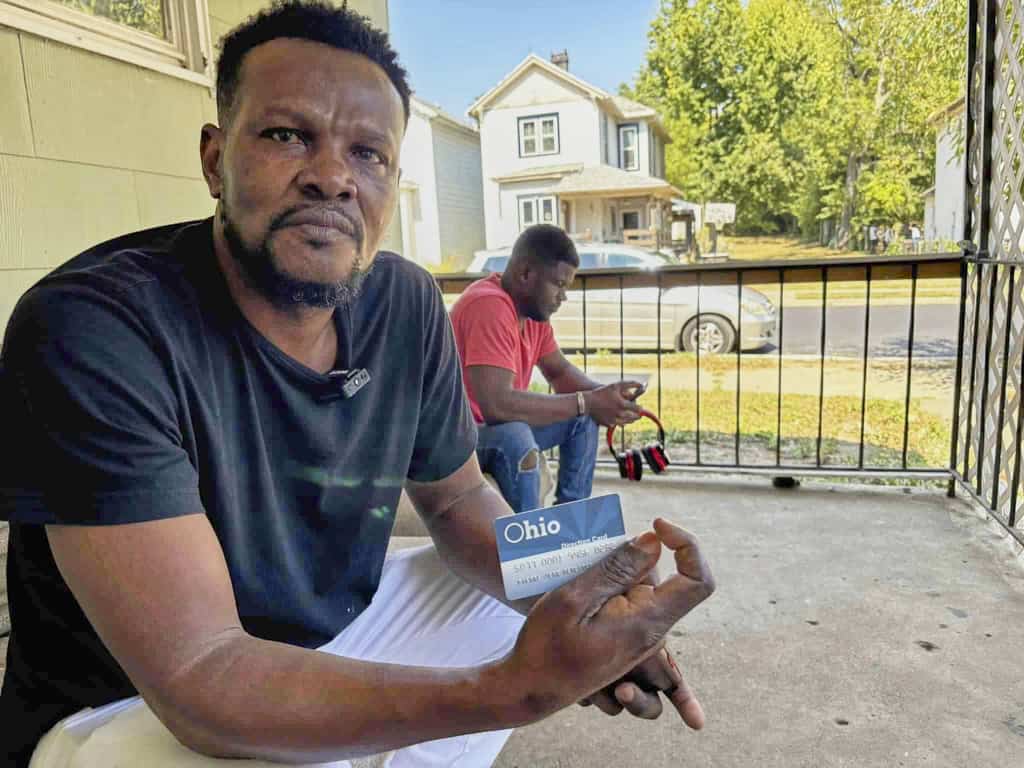 A few houses down the street from Coleman, we find Jean Pierre, a Haitian immigrant who speaks in halting English as other Creole-speaking Haitian men spill out of the modest home. He’s been in the U.S. for about a year, coming from Florida after he heard from Haitians that it was easy to find work here.
A few houses down the street from Coleman, we find Jean Pierre, a Haitian immigrant who speaks in halting English as other Creole-speaking Haitian men spill out of the modest home. He’s been in the U.S. for about a year, coming from Florida after he heard from Haitians that it was easy to find work here.
Other Haitians echo the same themes.
They came here to work. They work hard. It was pretty easy (although one family had to traverse through Brazil and then Mexico). Others just filled out an application and boom! They were in. They weren’t bused to Springfield; they started somewhere else (Georgia, Florida), and Haitians told them to go to Springfield because it was easy to get a job. Yes, they get debit cards. Yes, they get driver’s licenses. And even though it’s illegal, some plan to vote.
“It’s very hard for the immigrant,” Pierre says. He is grateful for the chance to add his voice and is very aware of the controversies on social media and Trump’s comments.
The national media have painted the cat-and-dog comments as provoking violence, even ludicrously tying them to the 2nd assassination attempt of Trump in Florida, which was allegedly committed by a Hawaiian Democratic donor with a Biden-Harris bumper sticker and an obsession over Ukraine.
The harm Pierre describes, though, is emotional. His feelings are hurt. He’s hurt when some people in Springfield won’t greet him in stores. He’s hurt that Trump thinks Haitians are here to cause “trouble.” At least in Haiti, he is treated with respect.
“We coming here to do the bad thing? That’s not true,” Pierre says.
Pierre intends to go back to Haiti when his temporary protective status expires, but he’s barely making enough to get ahead here, where the wages range from $18 to $22 an hour, a measly amount quickly eaten up by rent, food, and other costs. He’s separated from his family. Although immigration can be big business, that’s not true for him.
Pierre tells us matter-of-factly that some people in Haiti DO eat cats, but he insists no one is doing that here. “Yes, in Haiti, yes – you can do it. Maybe in Haiti, you can find someone who eats a cat because you can do it in Haiti. But when you come here, you can’t do it, so you have respect for that. We know you cannot eat a cat when you are in the United States, and the Haitian people are very afraid to do something in a country that says you can’t do that,” he says.
“The Haitian people have a good heart. They love everyone. We don’t come here to make trouble with the American people. We come to help. We come to work hard.”
No one eats dogs anywhere, he insists. “Eat the dogs, I never see that.”
Pierre is considering voting. He knows Haitians who plan to vote for Harris even though they aren’t U.S. citizens – “a lot of people,” he reveals. That would be illegal, which is a point that he doesn’t seem to realize. Ohio has implemented a law that puts a small non-citizen label on the back of people’s driver’s licenses, however.
“I don’t know if I’m going to do it,” he says. He shows us a valid Ohio driver’s license that lists his hometown as Dayton. It was easy to get.
“A lot of people, Haitian people, they prefer Kamala Harris than Trump. They think that Trump has a trouble with them,” he says.
There seems to be meager if any effort to educate the new Haitian population about voting laws. A now-nixed voting registration form in Creole is the talk of the town. “A false Ohio voter registration form created in Haitian Creole was not approved or created by the Clark County Department of Job and Family Services,” the county says.
“We come here to work. I don’t want to give anyone any trouble here. If Haitians do something wrong, I say, ‘Forgive them,’” he says, molding his hands as if in prayer. “I say sorry for anything the Haitian people do wrong in this city.”
Pierre, who was a truck driver in Haiti, has a State of Ohio debit card. “To give me food,” he says. Pierre says the government put about $200 on the card monthly for a few months.
Yves Pierre Louis, another Haitian immigrant a few blocks over, says he came to the United States in 2020 because Haiti is “very dangerous for me,” and he wants to “send money to my family” of 12 kids.
At first, he worked in a hotel in Georgia. When COVID hit, he came to Springfield because another Haitian told Louis, a forklift driver: “It’s easy to find a job.”
“We come here for help and family. I hear Trump tell Haitian do this, Haitian do that. I live here with my dog here.” He opens the door and ushers out a menacing-looking pit bull. “Why I no eat that? Because the dog is important for anybody.”
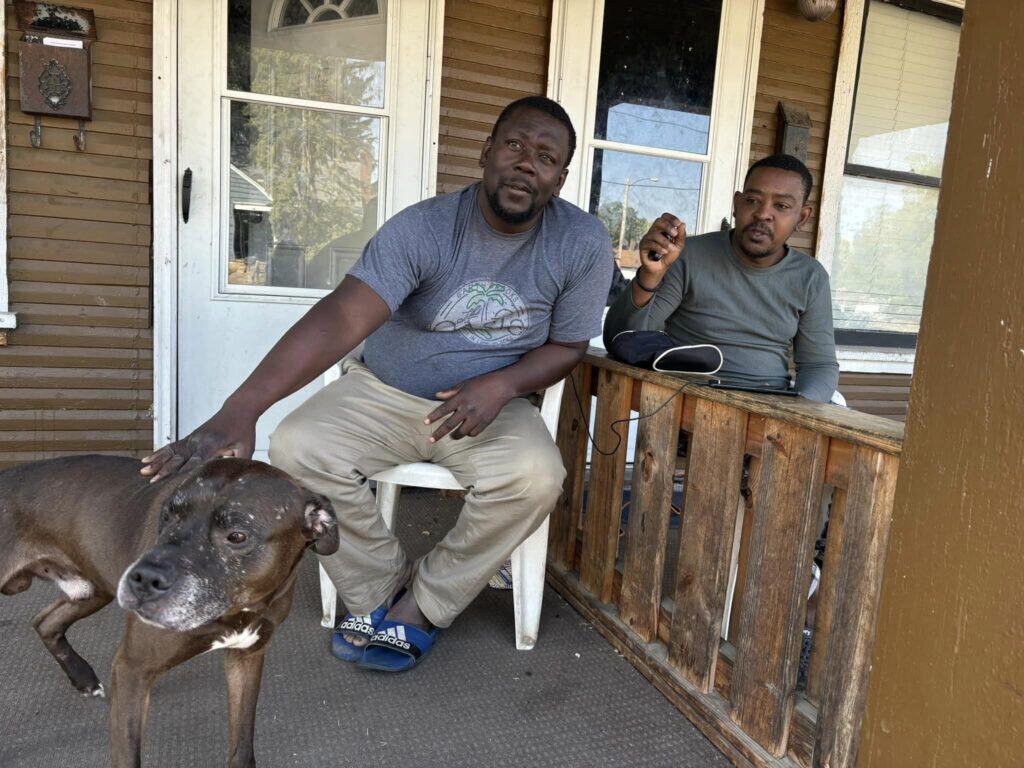
He says he’s never seen people eat cats or dogs in Haiti or here. “Some chicken, goat, beef.” To come here, he filled out an application and worked with a company from Taiwan, since you need a sponsor.
Louis insists, though: “I don’t have a problem with Trump. Trump is a person I am not supposed to like him, the woman too. I like everybody.” We ask if he is planning to vote. “Yes,” he says.
When we pressed and asked whether he’s a citizen and allowed to vote, he shifts. “If I try . . . what I think, we are not supposed to do that.”
The Ku Klux Klan Rears Its Ugly Head

Some ugliness has descended on the town, mainly from the outside, and it’s not only the bomb threats.
A Ku Klux Klan group from Kentucky papered some neighborhoods with recruitment flyers. We were shown the flyer by Trump supporters who were so angry about it that they reported it to the police.
We later came across several of the flyers folded up on the street.
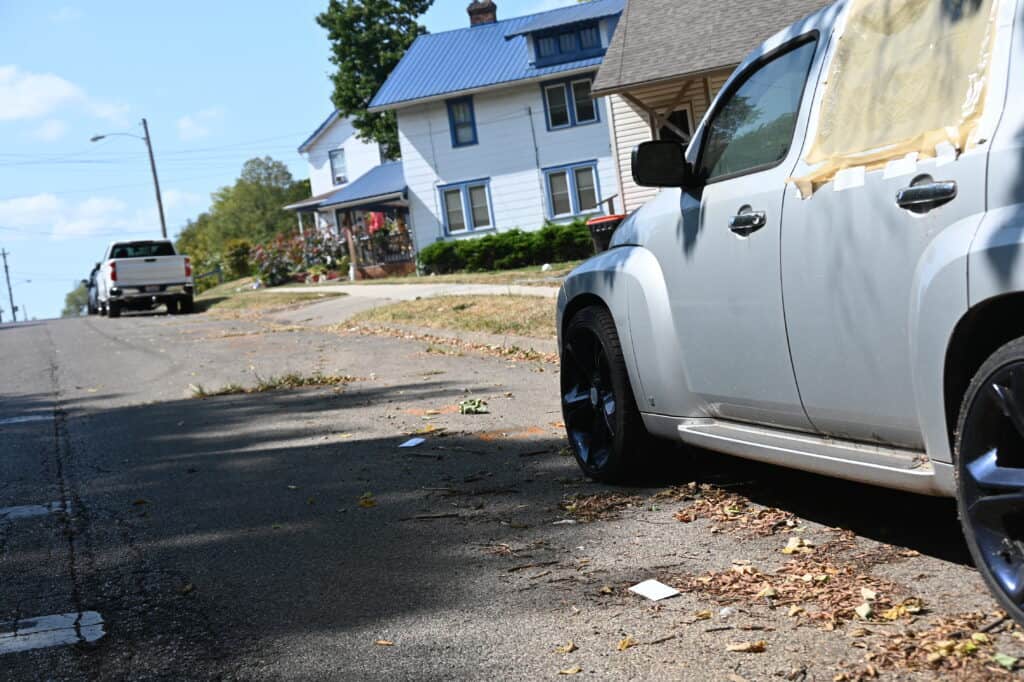
It’s a different vibe at Rose Goute Creole Restaurant, though, where a diverse crowd shows up for goat, chicken, turkey, plantains, and spaghetti. When we went there, the chicken was sold out, the crowd was happy, and everyone seemed to be getting along. The city says there are two Haitian restaurants, seven Haitian grocery stores, and one Haitian food truck in Springfield.
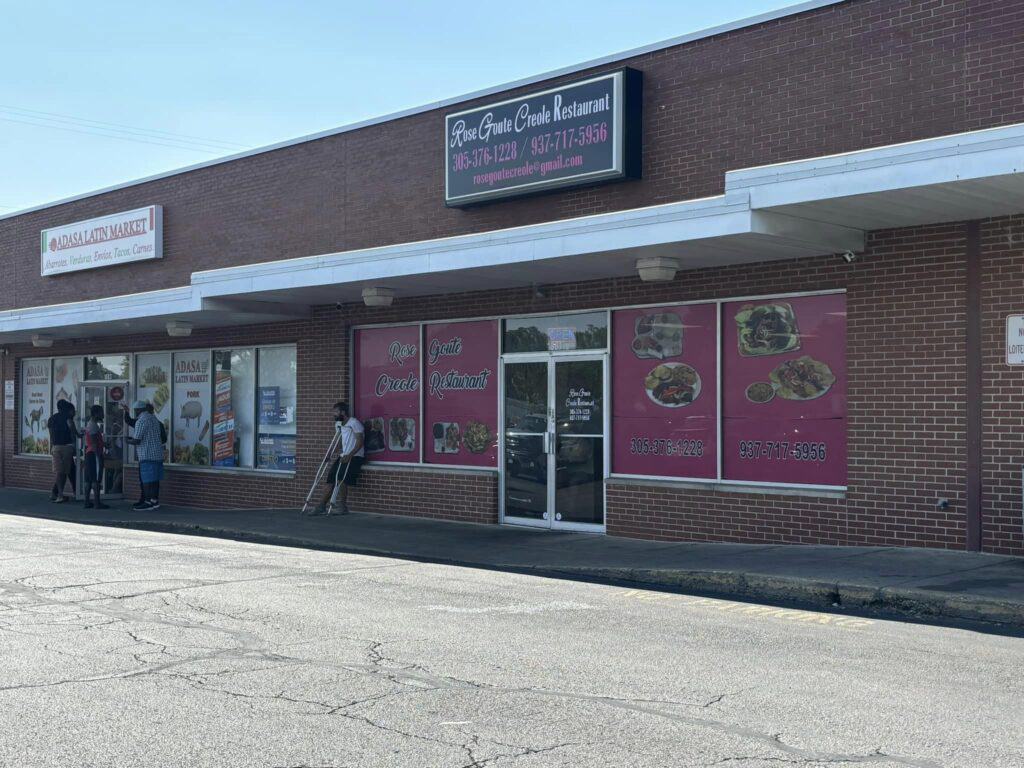
We ate turkey, rice, and beans as an Associated Press photographer bopped around taking pictures. A television crew from New York did interviews in the back.

The kind Haitian owner thanked us profusely for coming. But we didn’t interview people there, like everyone else. We headed into the neighborhoods.
Biden-Harris: ‘They’re the Disgrace’
Bernie Moreno, the Republican candidate for U.S. Senate in Ohio, is closing the gap with incumbent Democrat Sherrod Brown, by sounding a Trump-like immigration theme. Moreno is a Colombian immigrant and Cleveland businessman who came to America legally at age 5.
“This is not the fault of the Haitian refugees,” Moreno tells a crowd outside the Stella Bleu Bistro in Springfield. “Unfortunately, it took memes on the internet to get the attention of the media, but this has been going on for three years.”
“This is not the fault of the people of Springfield, Ohio. This is the fault of corrupt government politicians like Sherrod Brown and Joe Biden who have allowed that to happen. They put these people in this situation.” He included Harris on the list.
“They’re the disgrace. They’re the people that will be fired on Nov. 5.”
The Biden-Harris administration’s decision to grant “temporary protective status” and “immigration parole” to Haitians nationally was little explained to the public.
“The Secretary of Homeland Security may designate a foreign country for TPS due to conditions in the country that temporarily prevent the country’s nationals from returning safely,” the government says.
It’s completely incoherent; people from Central American countries are drowning in the Rio Grande but if you’re Haitian, you’re in.
In 2010, Haitians started getting TPS after a devastating earthquake, according to a May 2024 report from the Congressional Research Service. In 2017, the Trump administration, after briefly extending the designation, rescinded it, although that bogged down in endless ACLU-fueled legal battles.
On May 22, 2021, Biden’s Homeland Security Secretary Alejandro Majorkas ended those when he “announced a new, 18-month TPS designation for Haiti based on extraordinary and temporary conditions” that included “social unrest, an increase in human rights abuses, crippling poverty, and lack of basic resources, which are exacerbated by the COVID-19 pandemic.”
Haitians are in Ohio through the “Immigration Parole Program,” Springfield’s website says. “The U.S. government may grant advance travel authorization to up to 30,000 noncitizens each month to seek parole on a case-by-case basis under the processes for Cubans, Haitians, Nicaraguans, and Venezuelans,” the government’s website says. TPS is granted after you get here.
“Immigrants with TPS are legally qualified to receive financial assistance, health and nutrition services, employment and education services, and housing services,” the city says.
People with TPS status, a program dating to a 1990 act of Congress, “are not removable from the United States,” and are allowed to work, the government says, adding that they are screened. It lists 16 countries with TPS status. Some make sense (saving interpreters from Afghanistan). Others raise questions – Yemen, Ukraine, Sudan, Haiti.
As of March 31, 2024, approximately 863,880 foreign nationals had TPS status in the U.S. Of that, 200,005 Haitians who arrived after 2022 have TPS.
Trump terminated TPS status for multiple countries, including Haiti. The ACLU of California helped TPS recipients sue, some with U.S. citizen children. The latter is, of course, where new problems creep in (now they argue that kids are being separated from their parents! And of course, those kids will be voters someday.) The plaintiffs’ argument focused on the Trump administration adopting a “new narrow process” that doesn’t “consider all current conditions” in the involved countries. They accused Trump of racism. The case bogged down in California’s liberal courts.
The Biden-Harris administration swiftly restored the TPS after taking office, rendering the court case moot before it could land on the desk of SCOTUS.
Expletives Disrupt an Interview
Rob Rue is the mayor of Springfield. On Saturday, we encounter a local reporter interviewing Rue downtown, near the statue of George Rogers Clark, the Kentucky militiaman who fought in the Revolutionary War. The mayor is a controversial figure in town, called a “RINO” (Republican in Name Only) by some and chastised as “establishment.” The reporter later trashes him on X.
Rue, a funeral parlor owner, just assumed emergency powers because of security concerns.
The Buckeye Reporter has slammed Rue, accusing him of renting an apartment to a Haitian. The Buckeye Reporter says a different temp company owner also has 42 rental properties, painting immigration as a profitable business. Rue has denied conflicts of interest.
“Are you far left or far right?” he wearily asks us.
As Rue talks, people shout expletives at him from passing cars. “F*ck the Haitians,” yells a man. Another person yells something that sounds like “FJB.” Rue insists that Springfield is a great place. Another person pulls over. A contingent of “Proud Boys” is marching in the city.
Rue tells Wisconsin Right Now that he doesn’t want Trump or Harris to campaign in Springfield. “It would be very difficult to have them here.” He says neither campaign has reached out to him.
However, a few days later, Trump says he is coming to Springfield in the next two weeks.
“You may never see me again, but that’s okay. Whatever happened to Trump? Well, he never got out of Springfield,” Trump said in a rally, adding, “We’re going to take care of Ohio, and we’re going to take care of Colorado.” A lot of American communities are under “siege,” Trump said.
We asked whether Rue was asking Trump not to come, and he responded, “It would be overwhelming for Springfield to have either of the political leaders running for office for the presidency to come to Springfield.”
“It’s a lot of strain, period. We’ve already been in the national spotlight,” Rue says. “It’s a lot of stress. It’s a hot time. Why are you in Springfield, Ohio? You’re here because we have been affected by campaigning, and it’s been negative. So why am I talking to you? Because we’d like to tell our story. Springfield is a great place. It’s my hometown.”
However, Rue has also given media interviews in which he said things like, “This border crisis, the policy of this administration, is failing cities like ours and taxing us beyond our limit.” He tells us that he fundamentally blames an “open border.”
We tell the mayor that the Springfield residents we spoke to say they have been affected economically by the influx of immigrants, not by campaigning.
“Well, I’d say both. The influx has caused strain,” he says. “I won’t deny that. I haven’t denied that at all. It’s caused strain.”
Beth Heffner, the woman wearing a “fight, fight, fight!” T-shirt, is standing nearby, listening. She expresses anger the second the mayor walks off.
“It’s disgusting,” she says.
She’s upset he doesn’t want to welcome Trump, who she sees as trying to solve a problem other officials caused, from Biden and Harris on down. It was done too fast and without a clear plan, she says. It’s a mess.
“They did it all wrong.”
Table of Contents


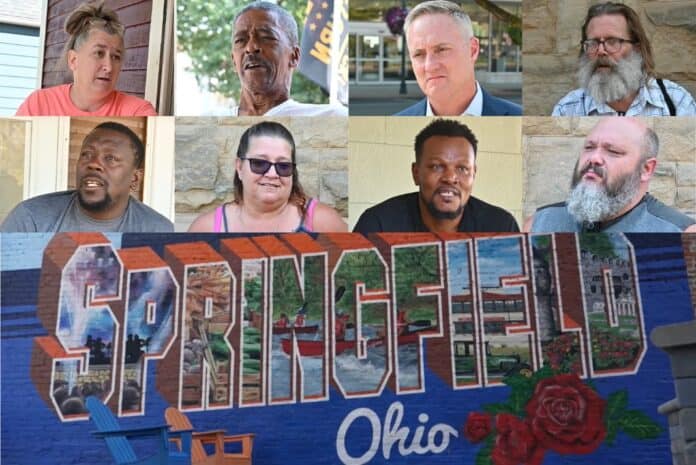









![Generation Gap [Up Against the Wall]](https://www.wisconsinrightnow.com/wp-content/uploads/2025/01/MixCollage-05-Jan-2025-10-32-PM-6058-356x220.jpg)



















